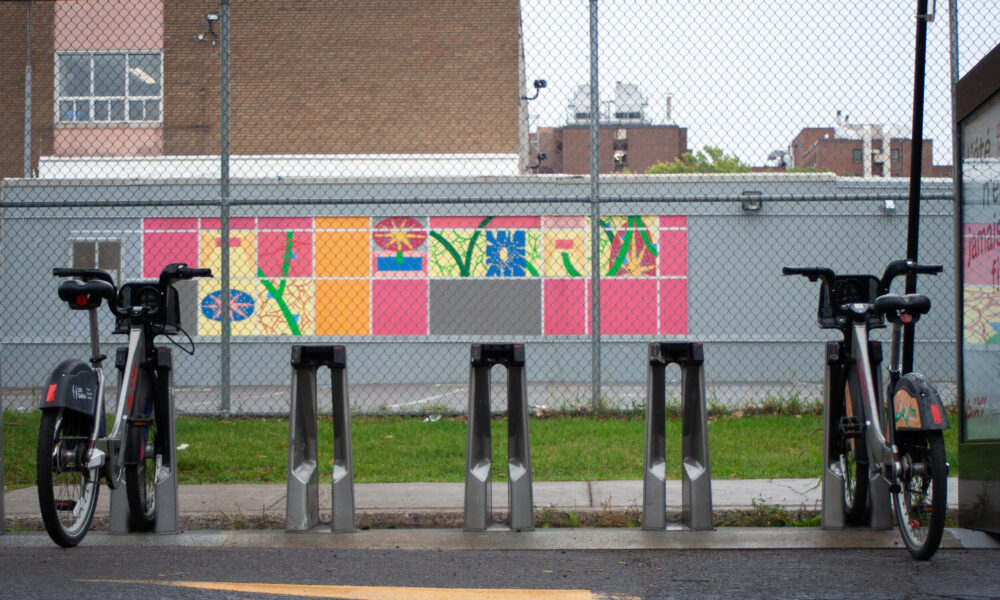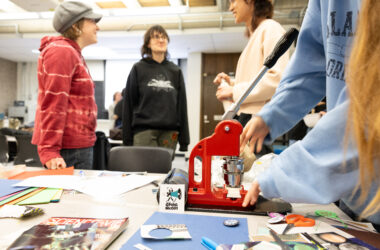As classes begin this Fall term, BIXI bikes return as a typical transport choice for McGill students. Montreal is often ranked among the most bikeable cities in North America, with more than 1,000 kilometres of cycling infrastructure across the city. BIXI, the city’s station-based bike-sharing system, hosts 12,600 bikes and almost 1,000 stations.
Many McGill students have described the common challenges of navigating BIXI services: Searching for an open dock, struggling to enter and stay in bike lanes, or finding bikes unavailable when they need them. Despite these issues, BIXI remains one of the most common ways for students to get around.
On June 11, PhD candidate Daniel Romm and colleagues at McGill’s Department of Geography published a new study in the Journal of Cycling and Micromobility Research. Romm and his co-authors found that approximately 97.7 per cent of road space in Montreal is dedicated to automobiles, while only 2.3 per cent is allocated to micromobility infrastructure—largely bike lanes. Yet, micromobility methods of transport account for just 4.92 per cent of total trips taken, highlighting the current insufficiency of cycling infrastructure despite high demand.
In a written statement to The Tribune, Romm explained why inadequate bike lanes pose a problem for many potential users in Montreal.
“Insufficient bike infrastructure has two main harms: it discourages travel by bicycle, which provides people with more options and flexibility for how they get around […], and it threatens the safety of cyclists,” Romm wrote.
Romm’s study also shows that even if Montreal were to double its bike lanes, cars would still occupy more than 90 per cent of the municipality’s roadspace.
“There is room—and need—for both private vehicle ownership and sharing systems for micromobility,” Romm wrote. “They serve different populations and needs. [….] Encouraging more travellers to use non-car modes ultimately promises to ease traffic problems, as one more cyclist is potentially one less driver.”
Students at McGill also offered accounts of their experiences with Montreal’s bike lane infrastructure. Will Coward, U2 Engineering, noted in a written statement to The Tribune that Montreal’s biking culture is pleasant, despite micromobility challenges in the city.
“Although construction sometimes interferes with bike lanes and BIXI stations, biking around campus and the Plateau is still enjoyable,” he wrote.
Tatiana Bejarano, U2 Engineering, emphasized in a written statement to The Tribune that BIXI still needs to expand its services around campus to better cater to McGill’s student population.
“[BIXI’s] infrastructure around the main student areas remains insufficient, and the lack of docking spaces at BIXI stations can cause significant distress for university commuters,” Bejarano wrote.
Romm highlighted that the study also aims to help government officials and city planners make better decisions regarding micromobility infrastructure, especially in areas where biking is an essential mode of transportation, such as around campus and Milton-Parc.
“The orientation of our study is to assist policy-makers, advocates, and others in communicating about street space, including possible changes to it by installing new infrastructure,” Romm wrote.
Kevin Manaugh, McGill Geography professor and research co-lead with the McGill Sustainability Systems Initiative, explained in a written statement to The Tribune that Montreal’s city policies must better address micromobility.
“Policies should ensure that cycling is treated as a core mode of transportation, not an afterthought,” Manaugh wrote. “That means dedicated budgets, city-wide planning, integration with transit, and measures to ensure equity—so that infrastructure isn’t concentrated only in central or wealthier areas.”
Romm stressed the importance of Montreal’s upcoming municipal elections in dictating the future of the city’s micromobility infrastructure, which may give McGill students hope for safer and more accessible cycling support around campus.
“Whether or not the city continues to invest in protecting cyclists and encouraging non-automotive travel rests, in part, on the results of this next election,” Romm wrote.
Romm further expressed his hope that Montreal will follow the global urban trend of reducing reliance on cars in favour of safer, more accessible micromobility.
“There is a strong, growing global movement to reform our cities away from car dominance, and this is likely to continue on a global scale regardless of the [Montreal municipal] election,” Romm wrote. “The question is if Montreal will lead the way, as it has among North American cities, or fall behind.”









